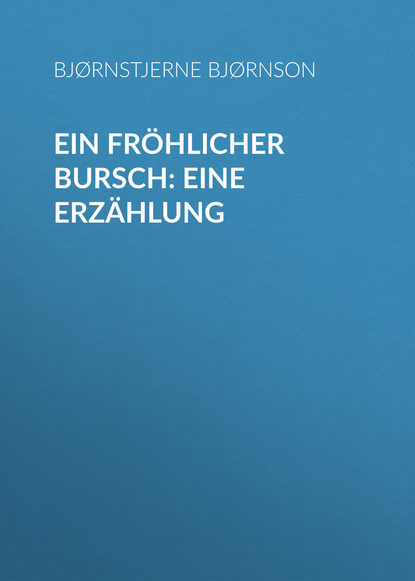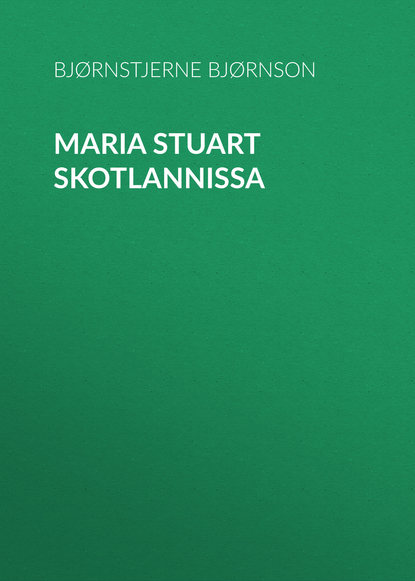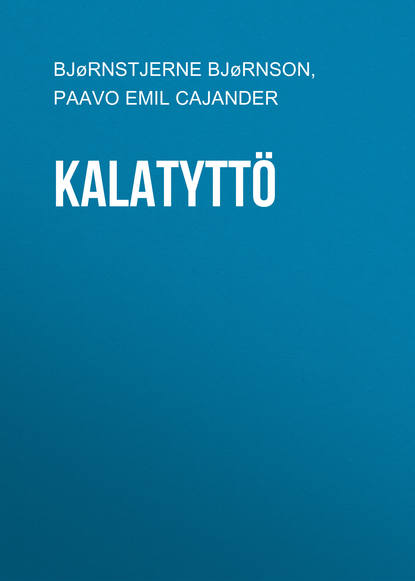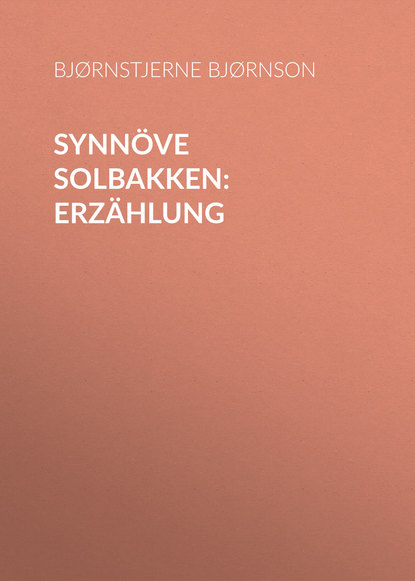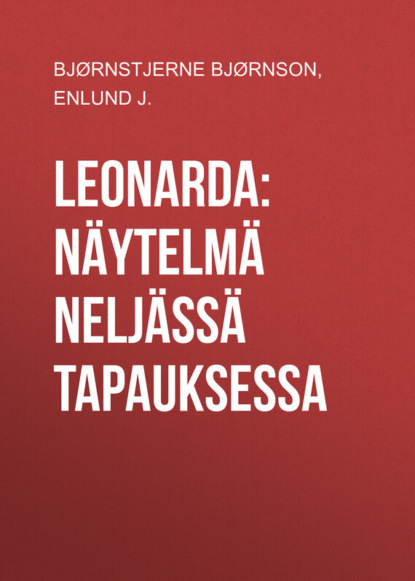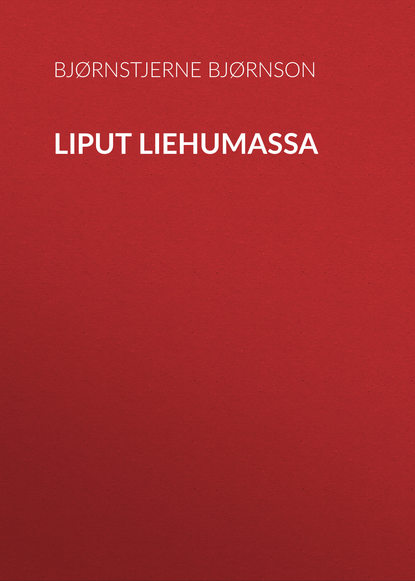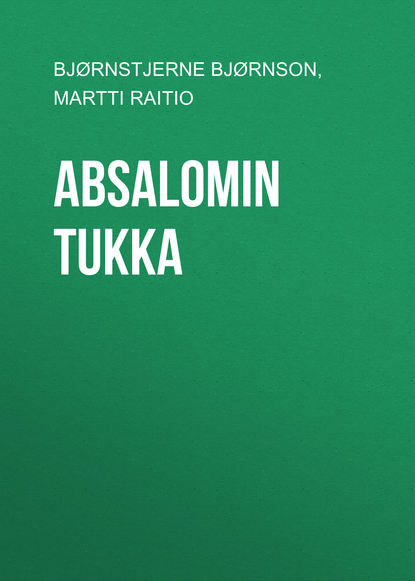
Полная версия
Arne; Early Tales and Sketches
On the litter lay a man with dark hair and pale face; the mother moved about weeping. "Lay him carefully on the bed," she begged, herself lending a helping hand. But while the men were moving with him, something made a noise under their feet. "Oh, it is only grandmother's spectacles," thought the boy, but he did not say so.
CHAPTER III
It was in the autumn, as before stated. A week after Nils the tailor was borne into Margit Kampen's home, there came word to him from the Americans that he must hold himself in readiness to start. He lay just then writhing under a terrible attack of pain, and, gnashing his teeth, he shrieked, "Let them go to hell!" Margit stood motionless, as though he had made no answer. He noticed this, and presently he repeated slowly and feebly, "Let them – go."
As the winter advanced, he improved so much that he was able to sit up, although his health was shattered for life. The first time he actually sat up, he took out his fiddle and tuned it, but became so agitated that he had to go to bed again. He grew very taciturn, but was not hard to get along with; and as time wore on, he taught the boy to read, and began to take work in at home. He never went out, and would not talk with those who dropped in to see him. At first Margit used to bring him the parish news; he was always gloomy afterwards, so she ceased to do so.
When spring had fairly set in, he and Margit would sit longer than usual talking together after the evening meal. The boy was then sent off to bed. Some time later in the spring their bans were published in church, after which they were quietly married.
He did his share of work in the fields now, and managed everything in a sensible, orderly way. Margit said to the boy, "There is both profit and pleasure in him. Now you must be obedient and good, that you may do your best for him."
Margit had remained tolerably stout through all her sorrow; she had a ruddy face and very large eyes, which looked all the larger because there was a ring round them. She had full lips, a round face, and looked healthy and strong, although she was not very strong. At this period of her life, she was looking better than ever; and she always sang when she was at work, as had ever been her wont.
One Sunday afternoon, father and son went out to see how the crops were thriving that year. Arne ran about his father, shooting with a bow and arrow. Nils had himself made them for the boy. Thus they passed on directly up toward the road leading past the church and parsonage, down to what was called the broad valley. Nils seated himself on a stone by the roadside and fell to dreaming; the boy shot into the road and sprang after his arrow, – it was in the direction of the church. "Not too far away!" said the father. While the boy was playing there, he paused, as though listening. "Father, I hear music!" The father listened too; they heard the sounds of fiddling, almost drowned at times by loud shouts and wild uproar; but above all rose the steady rumbling of cart-wheels and the clatter of horses' feet; it was a bridal procession, wending its way home from church. "Come here, boy," shouted the father, and Arne knew by the tones of the voice that he must make haste. The father had hurriedly risen and hidden behind a large tree. The boy hastened after him. "Not here, over there!" cried the father, and the boy stepped behind an alder-copse. Already the carts were winding round the birch-grove; they came at a wild speed, the horses were white with foam, drunken people were crying and shouting; father and son counted cart after cart, – there were in all fourteen. In the first sat two fiddlers, and the wedding march sounded merrily through the clear air, – a boy stood behind and drove. Afterwards came a crowned bride, who sat on a high seat and glittered in the sunshine; she smiled, and her mouth drew to one side; beside her sat a man clad in blue and with a mild face. The bridal train followed, the men sat on the women's laps; small boys were sitting behind, drunken men were driving, – there were six people to one horse; the man who presided at the feast came in the last cart, holding a keg of brandy on his lap. They passed by screaming and singing, and drove recklessly down the hill; the fiddling, the voices, the rattling of wheels, lingered behind them in the dust; the breeze bore up single shrieks, soon only a dull rumbling, and then nothing. Nils stood motionless; there was a rustling behind him, he turned; it was the boy who was creeping forward.
"Who was it, father?" But the boy started, for his father's face was dreadful. Arne stood motionless waiting for an answer; then he remained where he was because he got none. After some time he became impatient and ventured again. "Shall we go?" Nils was still gazing after the bridal train, but he now controlled himself and started on. Arne followed after. He put an arrow into the bow, shot it, and ran. "Do not trample down the grass," said Nils gruffly. The boy let the arrow lie and came back. After a while he had forgotten this, and once when his father paused, he lay down and turned summersaults. "Do not trample down the grass, I say." Here Arne was seized by one arm, and lifted by it with such violence that it was almost put out of joint. Afterward, he walked quietly behind.
At the door Margit awaited them; she had just come in from the stable, where she had evidently had pretty hard work, for her hair was tumbled, her linen soiled, her dress likewise, but she stood in the door smiling. "A couple of the cows got loose and have been into mischief; now they are tied again."
"You might make yourself a little tidy on Sunday," said Nils, as he went past into the house.
"Yes, there is some sense in tidying up now that the work is done," said Margit, and followed him. She began to fix herself at once, and sang while she was doing so. Now Margit sang well, but sometimes there was a little huskiness in her voice.
"Stop that screaming," said Nils; he had thrown himself on his back across the bed. Margit stopped.
Then the boy came storming in. "There has come into the yard a great black dog, a dreadful looking" —
"Hold your tongue, boy," said Nils from the bed, and thrust out one foot to stamp on the floor with it. "A devilish noise that boy is always making," he muttered afterward, and drew his foot up again.
The mother held up a warning finger to the boy. "You surely must see that father is not in a good humor," she meant. "Will you not have some strong coffee with syrup in it?" said she; she wanted to put him in a good humor again. This was a drink the grandmother had liked, and the rest of them too. Nils did not like it at all, but had drunk it because the others did so. "Will you not have some strong coffee with syrup in it?" repeated Margit; for he had made no reply the first time. Nils raised himself up on both elbows and shrieked, "Do you think I will pour down such slops?"
Margit was struck with surprise, and, taking the boy with her, went out.
They had a number of things to attend to outside, and did not come in before supper-time. Then Nils was gone. Arne was sent out into the field to call him, but found him nowhere. They waited until the supper was nearly cold, then ate, and still Nils had not come. Margit became uneasy, sent the boy to bed, and sat down to wait. A little after midnight Nils appeared.
"Where have you been, dear?" asked she.
"That is none of your business," he answered, and slowly sat down on the bench.
He was drunk.
After this, Nils often went out in the parish, and always came home drunk. "I cannot stand it at home here with you," said he once when he came in. She tried gently to defend herself, and then he stamped on the floor and bade her be silent: if he was drunk, it was her fault; if he was wicked, it was her fault too; if he was a cripple and an unfortunate being for his whole life, why, she was to blame too, and that infernal boy of hers.
"Why were you always dangling after me?" said he, and wept. "What harm had I done you that you could not leave me in peace?"
"Lord have mercy on me!" said Margit. "Was it I who went after you?"
"Yes, it was!" he shrieked as he arose, and amid tears he continued: "You have succeeded in getting what you wanted. I drag myself about from tree to tree. I go every day and look at my own grave. But I could have lived in splendor with the finest gard girl in the parish. I might have traveled as far as the sun goes, had not you and your damned boy put yourselves in my way."
She tried again to defend herself. "It was, at all events, not the boy's fault."
"If you do not hold your tongue, I will strike you!" – and he struck her.
After he had slept himself sober the next day, he was ashamed, and was especially kind to the boy. But soon he was drunk again, and then he struck the mother. At last he got to striking her almost every time he was drunk. The boy cried and lamented; then he struck him too. Sometimes his repentance was so deep that he felt compelled to leave the house. About this time his fondness for dancing revived. He began to go about fiddling as in former days, and took the boy with him to carry the fiddle-case. Thus Arne saw a great deal. The mother wept because he had to go along, but dared not say so to the father. "Hold faithfully to God, and learn nothing evil," she begged, and tenderly caressed her boy. But at the dances there was a great deal of diversion; at home with the mother there was none at all. Arne turned more and more from her and to the father; she saw this and was silent. At the dances Arne learned many songs, and he sang them at home to his father; this amused the latter, and now and then the boy could even get him to laugh. This was so flattering to Arne that he exerted himself to learn as many songs as possible; soon he noticed what kind the father liked best, and what it was that made him laugh. When there was not enough of this element in the songs he was singing, the boy added to it himself, and this early gave him practice in adapting words to music. It was chiefly lampoons and odious things about people who had risen to power and prosperity, that the father liked and the boy sang.
The mother finally concluded to take him with her to the stable of evenings; numerous were the pretexts he found to escape going, but when, nevertheless, she managed to take him with her, she talked kindly to him about God and good things, usually ending by taking him in her arms, and, amid blinding tears, begging him, entreating him not to become a bad man.
The mother taught the boy to read, and he was surprisingly quick at learning. The father was proud of this, and, especially when he was drunk, told Arne he had his head.
Soon the father fell into the habit, when drink got the better of him, of calling on Arne at dancing-parties to sing for the people. The boy always obeyed, singing song after song amid laughter and uproar; the applause pleased the son almost more than it did the father, and finally there was no end to the songs Arne could sing. Anxious mothers who heard this, went themselves to his mother and told her of it; their reason for so doing being that the character of these songs was not what it should be. The mother put her arms about her boy and forbade him, in the name of God and all that was sacred, to sing such songs, and now it seemed to Arne that everything he took delight in his mother opposed. For the first time he told his father what his mother had said. She had to suffer for this the next time the father was drunk; he held his peace until then. But no sooner had it become clear to the boy what he had done than in his soul he implored pardon of God and her; he could not bring himself to do so in spoken words. His mother was just as kind as ever to him, and this cut him to the quick.
Once, however, he forgot this. He had a faculty for mimicking people. Above all, he could talk and sing as others did. The mother came in one evening when Arne was entertaining his father with this, and it occurred to the father, after she had gone out, that the boy should imitate his mother's singing. Arne refused at first, but his father, who lay over on the bed and laughed until it shook, insisted finally that he should sing like his mother. She is gone, thought the boy, and cannot hear it, and he mimicked her singing as it sounded sometimes when she was hoarse and choked with tears. The father laughed until it seemed almost hideous to the boy, and he stopped of himself. Just then the mother came in from the kitchen; she looked long and hard at the boy, as she crossed the floor to a shelf after a milk-pan and turned to carry it out.
A burning heat ran through his whole body; she had heard it all. He sprang down from the table where he had been sitting, went out, cast himself on the ground, and it seemed as though he must bury himself out of sight. He could not rest, and got up feeling that he must go farther on. He went past the barn, and behind it sat the mother, sewing on a fine, new shirt, just for him. She had always been in the habit of singing a hymn over her work when she sat sewing, but now she was not singing. She was not weeping, either; she only sat and sewed. Arne could bear it no longer he flung himself down in the grass directly in front of her, looked up at her, and wept and sobbed bitterly. The mother dropped her work and took his head between her hands.
"Poor Arne!" said she, and laid her own beside his. He did not try to say a word, but wept as he had never done before. "I knew you were good at heart," said the mother, and stroked down his hair.
"Mother, you must not say no to what I am going to ask for," was the first thing he could say.
"That you know I cannot do," answered she.
He tried to stop crying, and then stammered out, with his head still in her lap: "Mother, sing something for me."
"My dear, I cannot," said she, softly.
"Mother, sing something for me," begged the boy, "or I believe I will never be able to look at you again."
She stroked his hair, but was silent.
"Mother, sing, sing, I say! Sing," he begged, "or I will go so far away that I will never come home any more."
And while he, now fourteen in his fifteenth year as he was, lay there with his head in his mother's lap, she began to sing over him: —
"Father, stretch forth Thy mighty hand,Thy Holy Spirit send yonder:Bless Thou the child on the lonely strand,Nor in its sports let it wander.Slipp'ry the way, the water deep, —Lord, in Thy arm but the darling keep,Then through Thy mercy 't will neverDrown, but with Thee live forever."Missing her child, in disquiet sore,Much for its safety fearing,Often the mother calls from her door,Never an answer hearing, —Then comes the thought: where'er it be,Blessed Lord, it is near to Thee;Jesus will guide his brotherHome to the anxious mother."7She sang several verses. Arne lay still: there descended upon him a blessed peace, and under its influence he felt a refreshing weariness. The last thing he distinctly heard was about Jesus: it bore him into the midst of a great light, and there it seemed as though twelve or thirteen were singing; but the mother's voice rose above them all. A lovelier voice he had never heard; he prayed that he might sing thus. It seemed to him that if he were to sing right softly he might do so; and now he sang softly, tried again softly, and still more softly, and then, rejoiced at the bliss that seemed almost dawning for him, he joined in with full voice, and the spell was broken. He awakened, looked about him, listened, but heard nothing, save the everlasting, mighty roar of the force, and the little creek that flowed past the barn, with its low and incessant murmuring. The mother was gone, – she had laid under his head the half-finished shirt and her jacket.
CHAPTER IV
When the time came to take the herds up into the woods, Arne wanted to tend them. His father objected; the boy had never tended cattle, and he was now in his fifteenth year. But he was so urgent that it was finally arranged as he wished; and the entire spring, summer, and autumn he was in the woods by himself the livelong day, only going home to sleep.
He took his books up there with him. He read and carved letters in the bark of the trees; he went about thinking, longing, and singing. When he came home in the evening his father was often drunk, and beat the mother, cursed her and the parish, and talked about how he might once have journeyed far away. Then the longing for travel entered the boy's mind too. There was no comfort at home, and the books opened other worlds to him; sometimes it seemed as though the air, too, wafted him far away over the lofty mountains.
So it happened about midsummer that he met Kristian, the captain's eldest son, who came with the servant boy to the woods after the horses, in order to get a ride home. He was a few years older than Arne, light-hearted and gay, unstable in all his thoughts, but nevertheless firm in his resolves. He spoke rapidly and in broken sentences, and usually about two things at once; rode horseback without a saddle, shot birds on the wing, went fly-fishing, and seemed to Arne the goal of his aspirations. He also had his head full of travel, and told Arne about foreign lands until everything about them was radiant. He discovered Arne's fondness for reading, and now carried up to him those books he had read himself. After Arne had finished reading these, Kristian brought him new ones; he sat there himself on Sundays, and taught Arne how to find his way in the geography and the map; and all summer and autumn Arne read until he grew pale and thin.
In the winter he was allowed to read at home; partly because he was to be confirmed the next year, partly because he always knew how to manage his father. He began to go to school; but there he took most comfort when he closed his eyes and fancied himself over his books at home; besides, there were no longer any companions for him among the peasant boys.
His father's ill-treatment of the mother increased with years, as did also his fondness for drink and his bodily suffering. And when Arne, notwithstanding this, had to sit and amuse him, in order to furnish the mother with an hour's peace, and then often talk of things he now, in his heart, despised, he felt growing within him a hatred for his father. This he hid far down in his heart, as he did his love for his mother. When he was with Kristian, their talk ran on great journeys and books; even to him he said nothing about how things were at home. But many times after these wide-ranging talks, when he was walking home alone, wondering what might now meet him there, he wept and prayed to God, in the starry heavens, to grant that he might soon be allowed to go away.
In the summer he and Kristian were confirmed. Directly afterward, the latter carried out his plan. His father had to let him go from home and become a sailor. He presented Arne with his books, promised to write often to him, – and went away.
Now Arne was alone.
About this time he was again filled with a desire to write songs. He no longer patched up old ones; he made new ones, and wove into them all that grieved him most.
But his heart grew too heavy, and his sorrow broke forth in his songs. He now lay through long, sleepless nights, brooding, until he felt sure that he could bear this no longer, but must journey far away, seek Kristian, and not say a word about it to any one. He thought of his mother, and what would become of her, – and he could scarcely look her in the face.
He sat up late one evening reading. When his heart became too gloomy, he took refuge in his books, and did not perceive that they increased the venom. His father was at a wedding, but was expected home that evening; his mother was tired, and dreaded her husband's return; had therefore gone to bed. Arne started up at the sound of a heavy fall in the passage and the rattling of something hard, which struck against the door. It was his father who had come home.
Arne opened the door and looked at him.
"Is that you, my clever boy? Come and help your father up!"
He was raised up and helped in toward the bench. Arne took up the fiddle-case, carried it in, and closed the door.
"Yes, look at me, you clever boy. I am not handsome now; this is no longer tailor Nils. This I say – to you, that you – never shall drink brandy; it is – the world and the flesh and the devil – He resisteth the proud but giveth grace unto the humble. – Ah, woe, woe is me! – How far it has gone with me!"
He sat still a while, then he sang, weeping, —
"Merciful Lord, I come to Thee;Help, if there can be help for me;Though by the mire of sin defiled,I'm still thine own dear ransomed child."8"Lord, I am not worthy that Thou shouldest come under my roof; but speak the word only" – He flung himself down, hid his face in his hands, and sobbed convulsively. Long he lay thus, and then he repeated word for word from the Bible, as he had learned it probably more than twenty years before: "Then she came and worshiped Him, saying, Lord, help me! But he answered and said, It is not meet to take the children's bread, and to cast it to dogs. And she said, Truth, Lord, yet the dogs eat of the crumbs which fall from their master's table!"
He was silent now, and dissolved in a flood of tears.
The mother had awakened long since, but had not dared raise her eyes, now that her husband was weeping like one who is saved; she leaned on her elbows and looked up.
But scarcely had Nils descried her, than he shrieked out: "Are you staring at me; you, too? – you want to see, I suppose, what you have brought me to. Aye, this is the way I look, exactly so!" He rose up, and she hid herself under the robe. "No, do not hide, I will find you easily enough," said he, extending his right hand, and groping his way along with outstretched forefinger. "Tickle, tickle!" said he, as he drew off the covers and placed his finger on her throat.
"Father!" said Arne.
"Oh dear! how shriveled up and thin you have grown. There is not much flesh here. Tickle, tickle."
The mother convulsively seized his hand with both of hers, but could not free herself, and so rolled herself into a ball.
"Father!" said Arne.
"So life has come into you now. How she writhes, the fright! Tickle, tickle!"
"Father!" said Arne. The room seemed to swim about him.
"Tickle, I say!"
She let go his hands and gave up.
"Father!" shouted Arne. He sprang to the corner, where stood an axe.
"It is only from obstinacy that you do not scream. You had better not do so either; I have taken such a frightful fancy. Tickle, tickle!"
"Father!" shrieked Arne, seizing the axe, but remained standing as though nailed to the spot, for at that moment the father drew himself up, gave a piercing cry, clutched at his breast, and fell over. "Jesus Christ!" said he, and lay quite still.
Arne knew not where he stood or what he stood over; he waited, as it were, for the room to burst asunder, and for a strong light to break in somewhere. The mother began to draw her breath heavily, as though she were rolling off some great weight. She finally half rose, and saw the father lying stretched out on the floor, the son standing beside him with an axe.
"Merciful Lord, what have you done?" she shrieked, and started up out of bed, threw her skirt about her, and came nearer; then Arne felt as if his tongue were unloosed.
"He fell down himself," said he.
"Arne, Arne, I do not believe you," cried the mother, in a loud, rebuking tone. "Now Jesus be with you!" and she flung herself over the corpse, with piteous lamentation.
Now the boy came out of his stupor, and dropping down on his knees, exclaimed, "As surely as I look for mercy from God, he fell as he stood there."
"Then our Lord himself has been here," said she, quietly; and, sitting on the floor, she fixed her eyes on the corpse.
Nils lay precisely as he fell, stiff, with open eyes and mouth. His hands had drawn near together, as though he had tried to clasp them, but had been unable to do so.
"Take hold of your father, you are so strong, and help me lay him on the bed."
And they took hold of him and laid him on the bed. Margit closed his eyes and mouth, stretched him out and folded his hands.
Mother and son stood and looked at him. All they had experienced until then neither seemed so long nor contained so much as this moment. If the devil himself had been there, the Lord had been there also; the encounter had been short. All the past was now settled.



